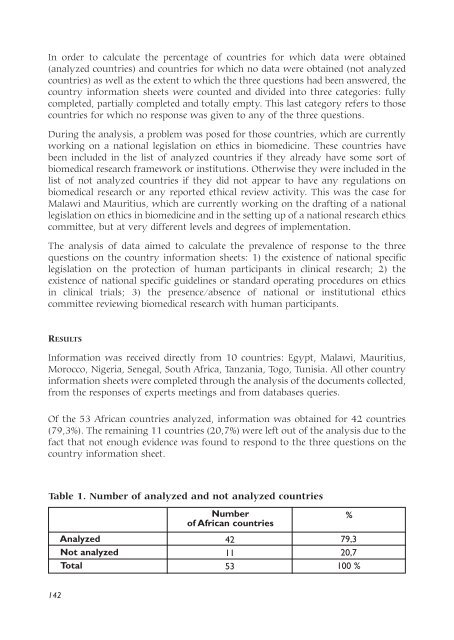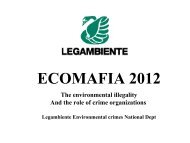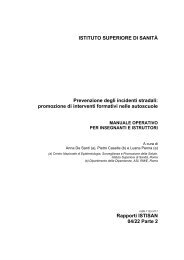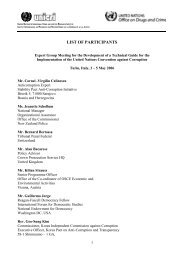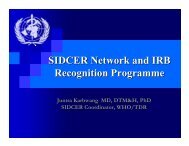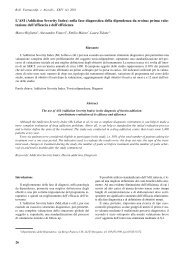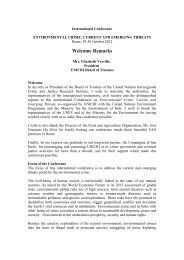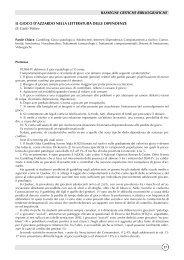Biomedical Research in Developing Countries - UNICRI
Biomedical Research in Developing Countries - UNICRI
Biomedical Research in Developing Countries - UNICRI
You also want an ePaper? Increase the reach of your titles
YUMPU automatically turns print PDFs into web optimized ePapers that Google loves.
In order to calculate the percentage of countries for which data were obta<strong>in</strong>ed<br />
(analyzed countries) and countries for which no data were obta<strong>in</strong>ed (not analyzed<br />
countries) as well as the extent to which the three questions had been answered, the<br />
country <strong>in</strong>formation sheets were counted and divided <strong>in</strong>to three categories: fully<br />
completed, partially completed and totally empty. This last category refers to those<br />
countries for which no response was given to any of the three questions.<br />
Dur<strong>in</strong>g the analysis, a problem was posed for those countries, which are currently<br />
work<strong>in</strong>g on a national legislation on ethics <strong>in</strong> biomedic<strong>in</strong>e. These countries have<br />
been <strong>in</strong>cluded <strong>in</strong> the list of analyzed countries if they already have some sort of<br />
biomedical research framework or <strong>in</strong>stitutions. Otherwise they were <strong>in</strong>cluded <strong>in</strong> the<br />
list of not analyzed countries if they did not appear to have any regulations on<br />
biomedical research or any reported ethical review activity. This was the case for<br />
Malawi and Mauritius, which are currently work<strong>in</strong>g on the draft<strong>in</strong>g of a national<br />
legislation on ethics <strong>in</strong> biomedic<strong>in</strong>e and <strong>in</strong> the sett<strong>in</strong>g up of a national research ethics<br />
committee, but at very different levels and degrees of implementation.<br />
The analysis of data aimed to calculate the prevalence of response to the three<br />
questions on the country <strong>in</strong>formation sheets: 1) the existence of national specific<br />
legislation on the protection of human participants <strong>in</strong> cl<strong>in</strong>ical research; 2) the<br />
existence of national specific guidel<strong>in</strong>es or standard operat<strong>in</strong>g procedures on ethics<br />
<strong>in</strong> cl<strong>in</strong>ical trials; 3) the presence/absence of national or <strong>in</strong>stitutional ethics<br />
committee review<strong>in</strong>g biomedical research with human participants.<br />
RESULTS<br />
Information was received directly from 10 countries: Egypt, Malawi, Mauritius,<br />
Morocco, Nigeria, Senegal, South Africa, Tanzania, Togo, Tunisia. All other country<br />
<strong>in</strong>formation sheets were completed through the analysis of the documents collected,<br />
from the responses of experts meet<strong>in</strong>gs and from databases queries.<br />
Of the 53 African countries analyzed, <strong>in</strong>formation was obta<strong>in</strong>ed for 42 countries<br />
(79,3%). The rema<strong>in</strong><strong>in</strong>g 11 countries (20,7%) were left out of the analysis due to the<br />
fact that not enough evidence was found to respond to the three questions on the<br />
country <strong>in</strong>formation sheet.<br />
Table 1. Number of analyzed and not analyzed countries<br />
Analyzed<br />
Not analyzed<br />
Total<br />
Number<br />
of African countries<br />
42<br />
11<br />
53<br />
%<br />
79,3<br />
20,7<br />
100 %<br />
142


